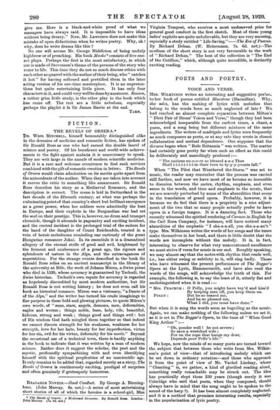POETS AND POETRY.
VOICE AND VERSE.
bias. WILKINSON writes an interesting and suggestive preacs. to her book of poems entitled Bluestone (Macmillan). Why, she asks, has the making of lyrics with melodies that belong to the words been so much neglected of late ? We had reached an almost complete separation between Milton's " Blest Pair of Sirens' Voices and Verse," though they had been acknowledged inseparable from the earliest times, a chant, a poem, and a song being but different mixtures of the same ingredients. The writers of madrigals and lyrics were frequently as much composers as poets, or at any rate they wrote in closest collaboration and mutual dependence. One supposes that the divorce began when " Rule Britannia " was written. The matter had certainly gone pretty far when such an effect as this could be deliberately and unsmilingly produced :- " The nations no-o-o-ot so blessed a-a-s Thee Shall i-i-i-i-i-i-i-i-in their turn to ty-y-y-yrants fall."
When " The Pilot that Weathered the Storm " was set to music, the reader may remember that the process was carried still further, and now we have most of us become so insensible to disunion between the metre, rhythm, emphasis, and even sense in the words, and time and emphasis in the music, that we are scarcely perturbed by some of the absurdities that occur in the translation of grand opera. Probably, however, it is because we do feel that there is a propriety in a nice adjust- ment of the two that so many people actually prefer to have opera in a foreign tongue. It is a damning fact. Those who recently witnessed the spirited rendering of Carmen in English by the Carl Rosa Company, for instance, will have noticed many absurdities of the emphatic " I sha-a-a-all, you sha-a-a-an't " type. Mrs. Wilkinson writes the words of her songs and the tunes make themselves in her head, and there is little doubt that the words are incomplete without the melody. It is, in fact, interesting to observe for what very unaccustomed excellences we must strive if verse for music is our end. Roughly speaking, we may almost say that the metrewith rhythm that reads well, i.e., has either swing or subtlety in it, will sing badly. Those who have witnessed the present performance of The Beggar's Opera at the Lyric, Hammersmith, and have also read the words of the songs, will acknowledge the truth of this. For example, the following is, to say the least of it, utterly fiat and undistinguished when it is read :- " Mrs. PEACHUM : 0 Polly, you might have toy'd and kiss'd By keeping men off, you keep them on. POLLY : But he so teazed me,
And he so pleased me, What I did, you must have done."
But when it is sung the words seem as beguiling as the music. Again, we can make nothing of the following unless we set it, as it is set in The Beggar's Opera, to the tune of " When Good King Arthur " :-
" Oh, ponder well ! be not severe ;
So save a wretched wife ;
For on the rope that hangs my dear, Depends poor Polly's life.
We hope, now the minds of so many poets are turned toward the subject that between those who write from Mrs. Wilkin- son's point of view—that of introducing melody which can be set down in ordinary notation—and those who approach it from the point of view of Mr. Vachel Lindsay, whose " Chanting " is, we gather, a kind of glorified reading aloud, something really remarkable may be struck out. The idea has practically slept these 250 years (though surely it was Coleridge who said that poets, when they composed, should always have in mind that the song ought to be spoken to the sound of the harp ?). It has been almost completely neglected, and it is a method that promises interesting results, especially
in the popularization of lyric poetry. •


































 Previous page
Previous page